The electronics ERP sector in the Philippines is experiencing rapid growth. As an electronics business owner, you may experience challenges for businesses operating in this dynamic environment. From managing complex supply networks to staying competitive in a fast-paced market..
However, with the right tools in place, these challenges can be transformed into opportunities for efficiency and growth. Enter electronics ERP systems that offer tailored solutions to streamline operations, improve resource management, and optimize production processes.
But how exactly do these systems deliver such transformative results? Let’s explore the key benefits and features that make them indispensable for electronics manufacturers. Keep reading to discover how ERP can elevate your business to the next level!
Key Takeaways
|
Table of Contents
What Is ERP for the Electronics Industry?
ERP for electronics industry is an all-encompassing software solution that consolidates various business functions into a single, unified system. This includes modules for accounting, human resources (HR), manufacturing, and sales.
In the Philippine context, ERP enhances efficiency by providing real-time insights and can be deployed on-premises, in the cloud, or as a SaaS solution. It assists in managing daily activities such as accounting and supply chain operations while supporting essential financial planning and reporting.
What Are the Functions and Benefits of ERP for the Electronics Industry?
 An ERP system plays a crucial role in streamlining operations and maximizing efficiency by seamlessly integrating various elements of the electronics manufacturing process, such as:
An ERP system plays a crucial role in streamlining operations and maximizing efficiency by seamlessly integrating various elements of the electronics manufacturing process, such as:
- Inventory transparency: ERP provides detailed tracking and smart procurement based on real-time data, reducing excess or shortages.
- Sales-driven purchasing: ERP enhances sales forecasting and purchasing strategies by aligning operations with best practices and company culture.
- Version control: ERP offers a centralized repository for product specifications, facilitating collaboration and effective lifecycle management.
- Counterfeit protection: ERP’s vendor portals prevent counterfeit parts and intellectual property theft, ensuring product authenticity and brand integrity.
Implementing an ERP system in electronic manufacturing within the Philippines offers numerous advantages. These benefits include real-time visibility across all business aspects, from financials to manufacturing, streamlining operations for greater efficiency, and empowering informed decision-making.
7 Key Features of ERP for the Electronics Industry
In the fast-evolving Philippine electronics industry, a robust Enterprise Resource Planning (ERP) system is indispensable. To effectively address the unique demands and complexities of this sector, an ideal ERP solution should include the following essential features:
- Manufacturing-specific accounting software: Automates real-time recording of production and operational expenses, providing oversight of raw material procurement and production costs. Enhances financial accuracy and supports cost-effective decision-making.
- Multi-level bill of materials: Offers a detailed breakdown of product components across multiple tiers, enabling precise evaluation of costs for raw materials, spare parts, and components. Supports efficient cost management and strategic planning.
- Material Requirements Planning (MRP): Provides a solution for production, scheduling, and inventory control. Engineers and managers can optimize schedules, plan resources, and manage inventory efficiently, improving production efficiency.
- Comparison reports for planning and execution: Generates reports comparing planned production with actual outcomes, enabling data-driven adjustments to enhance production efficiency through real-time evaluations.
- Real-time monitoring: Enables proactive monitoring of stock levels across warehouses, ensuring optimal inventory levels, reducing the risk of expiration, and improving supply chain management.
- Tailored HR management for manufacturing: Automates HR processes like salary calculations, leave management, insurance, and reimbursement tracking. Enhances efficiency and workforce productivity for manufacturing companies.
- Seamless ERP & IoT integration: Integrates ERP with IoT technology for automated data reports on production equipment quality. Enables real-time monitoring, issue resolution, and machine performance optimization.
10 Best Recommendations Electronics ERP
Selecting the right ERP solution is critical. Below are the top 10 ERP solutions tailored to the electronics industry, highlighting their features, strengths, and potential drawbacks.
1. HashMicro Electronics ERP
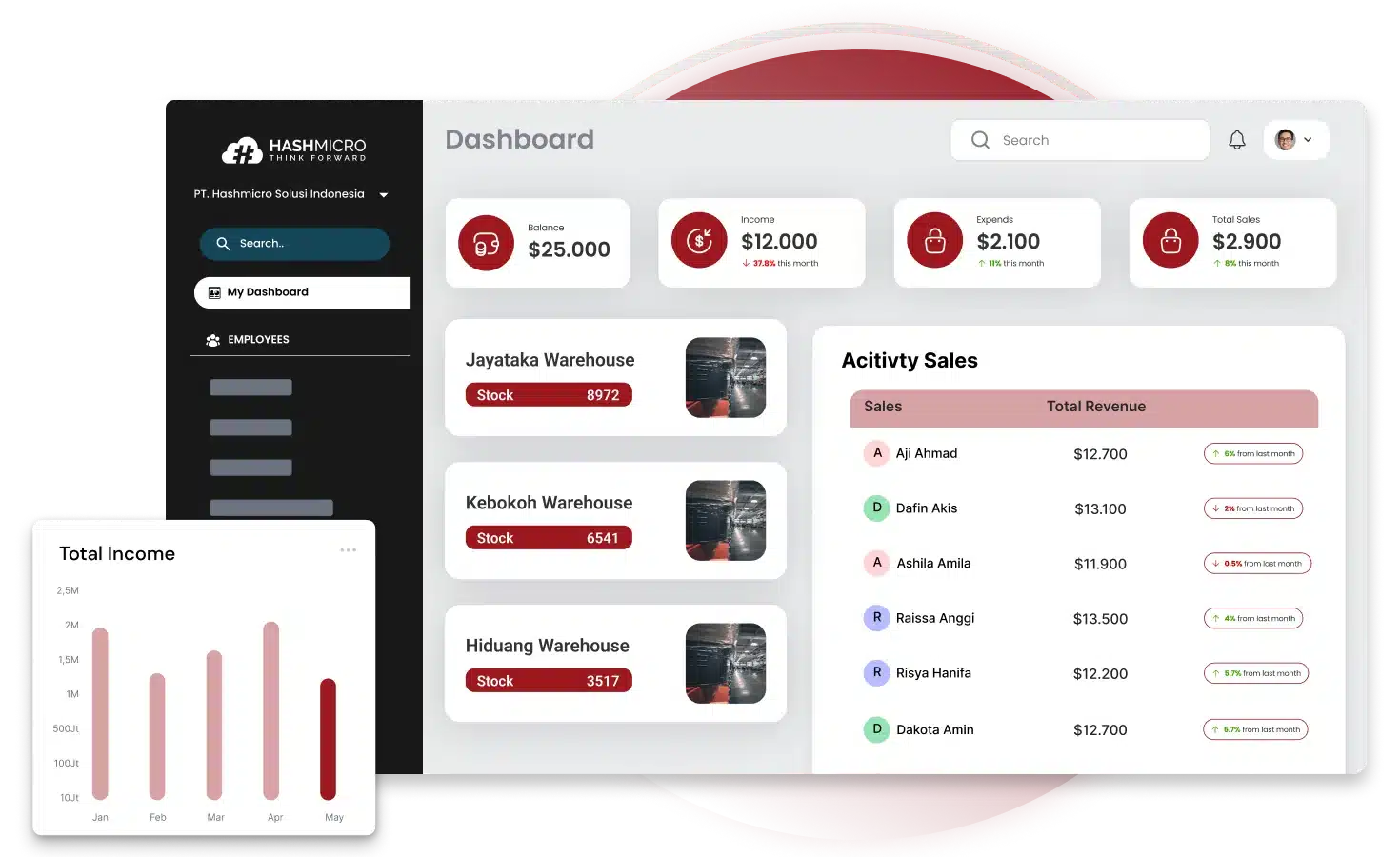 HashMicro ERP was founded in 2015 and has become a prominent player in Southeast Asia’s ERP market. The company’s ERP system for the packaging industry is designed to streamline operations and enhance productivity through automation and advanced resource management features.
HashMicro ERP was founded in 2015 and has become a prominent player in Southeast Asia’s ERP market. The company’s ERP system for the packaging industry is designed to streamline operations and enhance productivity through automation and advanced resource management features.
It offers deep integration with various modules and a free demo, making it an ideal choice for growing packaging companies. HashMicro also provides the latest advanced, AI-based, and comprehensive features. Here are some of them.
Key features:
- Built-in BI (Business Intelligence): Tools to transform and rotate data from different angles for more in-depth analysis.
- WhatsApp integration: Simplify, speed up, and streamline business communication.
- Mobile apps: The app is available on iOS and Google Play Store platforms, allowing easy access from various mobile devices.
- Sheet management: Efficiently manage, automate, and analyze spreadsheets or business documents in spreadsheet format while ensuring data security and module integration.
- Access-level: Features that manage and restrict employee access to various data and functions in the system based on roles and responsibilities.
| Pros | Cons |
| Highly scalable solution | It suits mid-scale to enterprise level corporation and not small business because of its comprehensive features |
| Intuitive user interface (UI) | |
| Strong customer support | |
| Advanced automation capabilities |
2. Deskera
Deskera is a widely recognized ERP software Philippines catering to SMEs. Founded in 2008, this cloud-based system offers an affordable yet comprehensive platform that serves electronics manufacturers with real-time analytics and mobile accessibility.
Key features:
- Cloud-based system
- Built-in CRM capabilities
- Real-time analytics
- Mobile-friendly design
| Pros | Cons |
| Affordable pricing plans | Limited features for larger enterprises |
| Easy to use and deploy | Customer support availability can be inconsistent |
| Excellent mobile application | Integration with third-party apps can be complex |
| Good for small to mid-sized businesses | Lacks advanced features for complex manufacturing |
3. Ecount
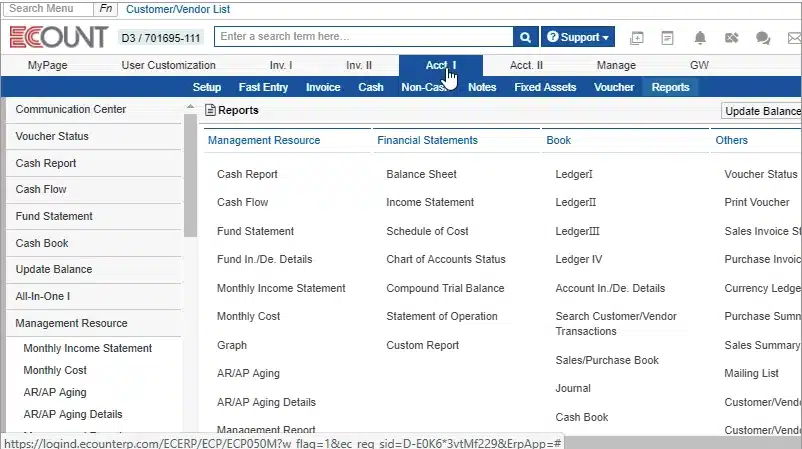 Ecount ERP is a budget-friendly, web-based solution aimed at small to medium-sized businesses. With over two decades in the market, Ecount offers a straightforward platform ideal for companies seeking streamlined ERP functionalities without the complexities of larger systems.
Ecount ERP is a budget-friendly, web-based solution aimed at small to medium-sized businesses. With over two decades in the market, Ecount offers a straightforward platform ideal for companies seeking streamlined ERP functionalities without the complexities of larger systems.
Key features:
- Fully web-based platform
- Real-time inventory tracking
- Invoicing and accounting integration
- Customizable dashboards
| Pros | Cons |
| Extremely affordable for small businesses | Limited customization options |
| User-friendly interface | Lacks advanced manufacturing features |
| Simple setup process | Limited scalability for large enterprises |
| Flexible pricing plans | Customer support can be slow during peak times |
4. Rsult
Rsult is a rising ERP provider known for its sleek design and focus on real-time data visibility. This cloud-based solution offers industry-specific modules for electronics manufacturers, enabling users to monitor performance and optimize workflows.
Key features:
- Industry-specific modules
- Cloud and mobile access
- Real-time performance monitoring
- Customizable workflows
| Pros | Cons |
| Highly customizable workflows | Limited global presence and support |
| Modern, intuitive interface | Some features require additional add-ons |
| Strong focus on data visibility | High upfront costs for advanced modules |
| Excellent integration capabilities | Lacks comprehensive third-party app support |
5. Captivea
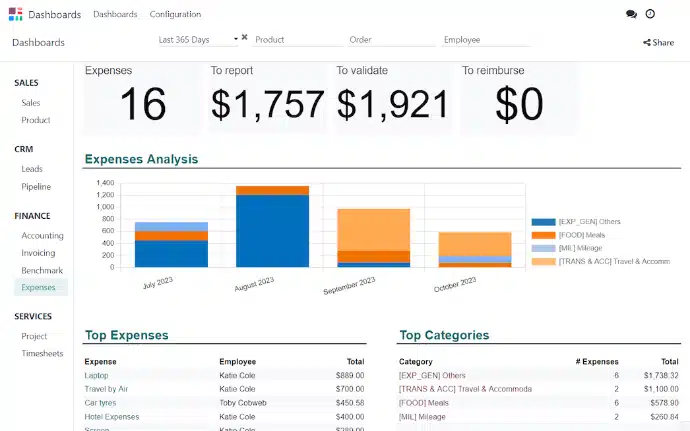 Captivea, a global ERP provider, has built a strong reputation for its integration capabilities, particularly through its implementations. This vendor caters to businesses of all sizes, providing user-friendly ERP solutions designed for manufacturers in the electronics sector.
Captivea, a global ERP provider, has built a strong reputation for its integration capabilities, particularly through its implementations. This vendor caters to businesses of all sizes, providing user-friendly ERP solutions designed for manufacturers in the electronics sector.
Key features:
- Extensive integration options
- User-centric design
- Cloud-based and on-premise solutions
- Modular structure
| Pros | Cons |
| Excellent integration with third-party apps | Premium pricing for advanced features |
| User-friendly and customizable | Implementation may take longer for larger enterprises |
| Global support network | Some features may require third-party tools |
| Scalable for all business sizes | Customer support responsiveness varies by region |
6. Syspro
Syspro is an established ERP provider specializing in manufacturing and distribution industries, including electronics. With years of expertise, Syspro offers a comprehensive platform tailored to the needs of mid-sized and large enterprises, focusing on production management and supply chain optimization.
Key features:
- Advanced supply chain management
- Production planning tools
- Built-in CRM functionality
- Multi-level Bill of Materials (BOM)
| Pros | Cons |
| Highly customizable for complex manufacturing | High setup costs for smaller businesses |
| Extensive supply chain management tools | Can be overwhelming for smaller teams |
| Excellent reporting capabilities | Learning curve for non-technical users |
| Strong global support | Requires regular updates to maintain optimal performance |
7. ERPNext
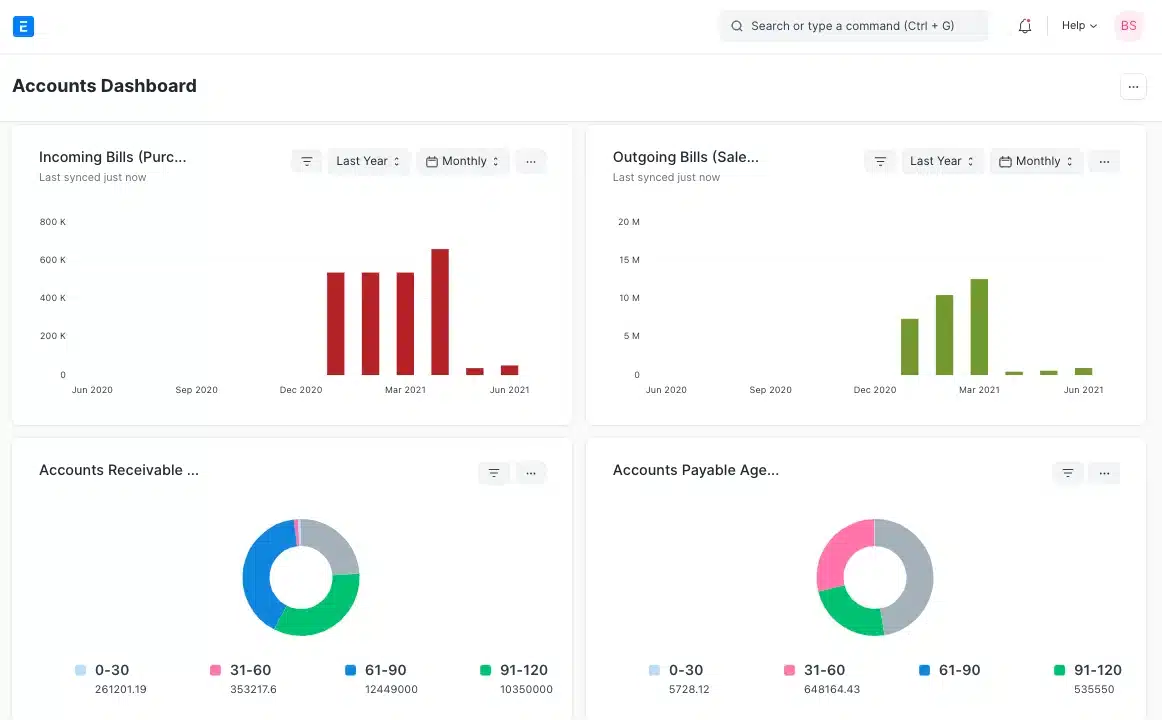 ERPNext is a high tech & electronics ERP that has garnered significant attention for its adaptability. Electronics manufacturers can customize ERPNext to suit their unique needs, offering flexibility for businesses of all sizes, from startups to large enterprises.
ERPNext is a high tech & electronics ERP that has garnered significant attention for its adaptability. Electronics manufacturers can customize ERPNext to suit their unique needs, offering flexibility for businesses of all sizes, from startups to large enterprises.
Key features:
- Open-source and customizable
- Comprehensive HR and payroll tools
- Multi-currency support
- Built-in project management
| Pros | Cons |
| Free and open-source | Requires significant technical expertise to set up |
| Fully customizable | Limited customer support compared to paid solutions |
| Great for businesses of all sizes | Can be complex for non-technical users |
| Supports various industries | Limited third-party app integration |
8. Priority Software
Priority Software is a high tech & electronics ERP provider offering solutions for businesses across various industries. Founded in 1986, Priority Software is designed to support both SMBs and large enterprises with a user-friendly interface and robust functionalities.
Key features:
- Real-time analytics
- Multi-device accessibility
- Advanced automation
- Comprehensive financial management
| Pros | Cons |
| User-friendly interface | High upfront implementation costs |
| Excellent mobile accessibility | Limited customization for small businesses |
| Multi-device support | Some features may require additional modules |
| Good customer service | Not as robust for complex manufacturing needs |
9. Abas ERP
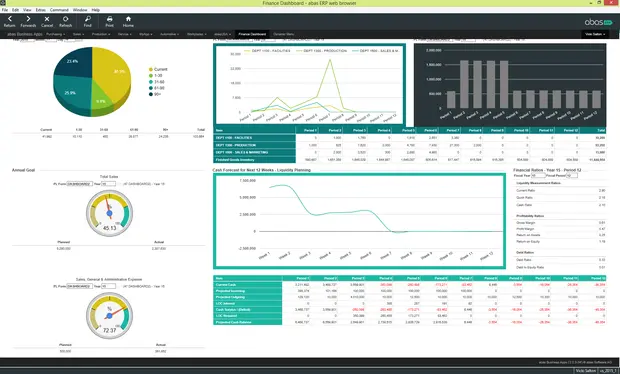 Abas ERP is a seasoned player in the ERP market, serving manufacturing companies for over 40 years. Its flexible, customizable platform is designed to address the complex needs of electronics manufacturers, offering specialized tools for production, financials, and inventory management.
Abas ERP is a seasoned player in the ERP market, serving manufacturing companies for over 40 years. Its flexible, customizable platform is designed to address the complex needs of electronics manufacturers, offering specialized tools for production, financials, and inventory management.
Key features:
- Customizable modules
- Real-time production tracking
- Inventory and supply chain management
- In-depth reporting tools
| Pros | Cons |
| Flexible customization | Expensive for smaller businesses |
| Strong support for manufacturing processes | May require additional training for users |
| Excellent reporting capabilities | Some features are add-ons and cost extra |
| Global customer support | Requires periodic system upgrades for optimal use |
10. Infor
Infor is a global high tech & electronics ERP, offering a cloud-based platform tailored to various industries, including electronics manufacturing. Known for its scalability, Infor provides a range of tools designed to streamline operations, improve decision-making, and enhance customer support.
Key features:
- AI-driven analytics
- Scalable cloud platform
- Comprehensive customer support
- Multi-device access
| Pros | Cons |
| Scalable for businesses of all sizes | Higher pricing tiers for advanced features |
| Excellent AI-driven analytics | Can be complex to configure without expert help |
| Strong customer support network | Premium features may increase overall costs |
| Seamless mobile integration | Steep learning curve for new users |
Also read: Top 6 Metal Fabrication ERP in the Philippines
Conclusion
The dynamic and intricate nature of the Philippine electronics industry presents multifaceted challenges. However, the implementation of ERP software offers a crucial solution. ERP for the electronics industry serves as a comprehensive software solution.
As the leading ERP in the Philippines, HashMicro ERP for the electronics industry provides a strategic advantage in meeting the dynamic demands of the electronics manufacturing sector. If you want to try its free demo, click the banner below and find out how this system could transform your business efficiently.

FAQ About Electronics ERP
-
What is ERP electrical?
ERP for electrical is a software solution that helps electrical companies manage essential functions like project planning, inventory control, procurement, and financial tracking, improving efficiency and operational control across all business areas.
-
Where does ERP stand for?
ERP stands for Enterprise Resource Planning, which refers to a type of software system that organizations use to manage and integrate important parts of their businesses, including finance, supply chain, manufacturing, and human resources.
-
What is an ERP example?
An example of an ERP system is HashMicro, which offers integrated solutions for inventory management, accounting, sales, and customer relationship management tailored for various industries.




































